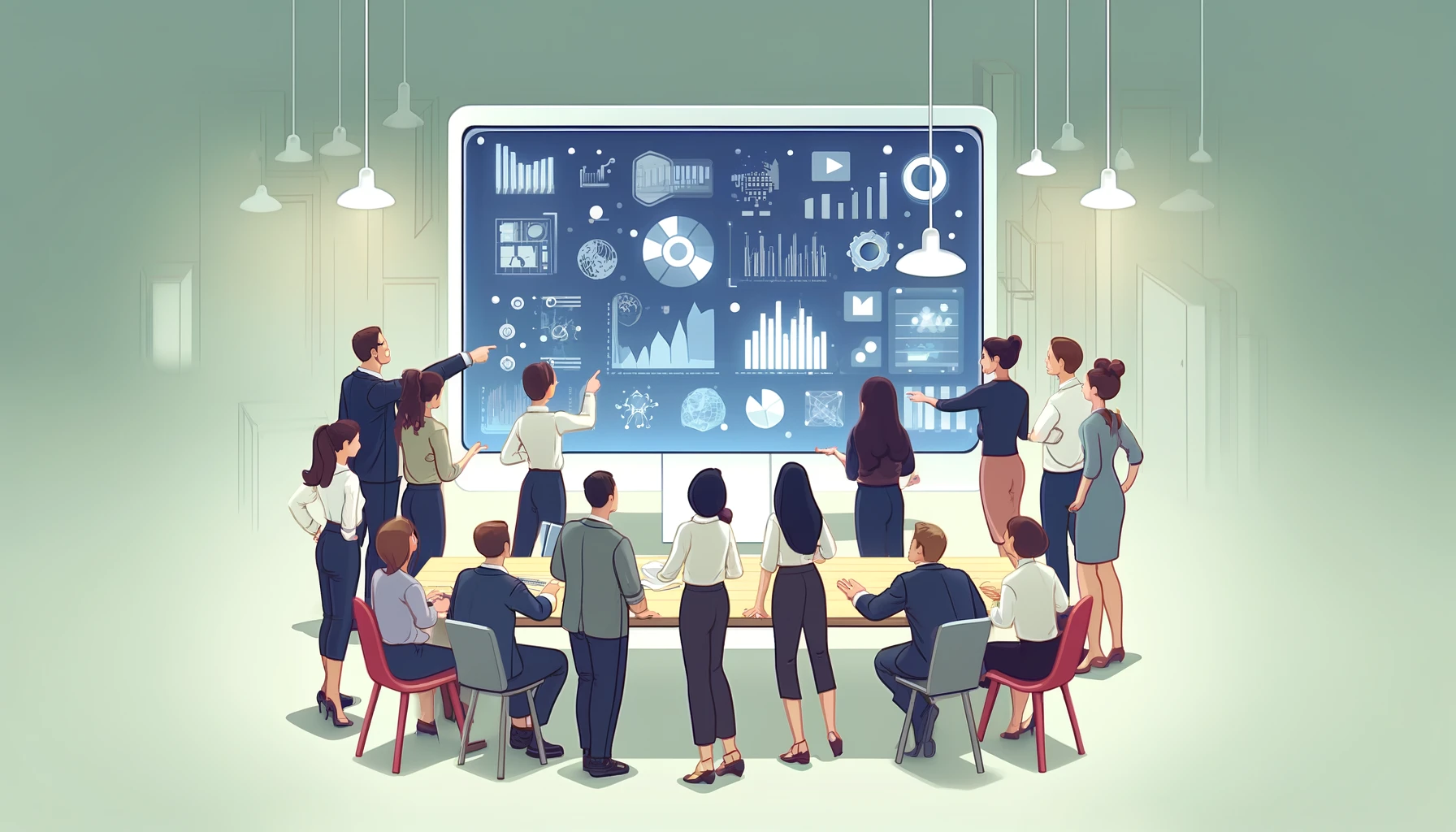ERP for Small Business UK: Streamlining Operations

Discover how ERP solutions empower UK small businesses to streamline operations, enhance efficiency, and drive growth.
Streamlining Operations with ERP Solutions
In the dynamic business landscape of the UK, small businesses are increasingly turning to ERP (Enterprise Resource Planning) systems as a beacon for growth and efficiency. The integration of ERP solutions is not just about keeping pace with competitors but about catapulting operations to new heights of productivity.
By centralizing data, these systems break down silos between departments, offering unprecedented visibility and cohesiveness. From procurement to customer service, an ERP system can simplify complex processes, allowing businesses to focus on strategy and customer engagement. With real-time insights, decision-making becomes more informed, positioning small businesses to act swiftly and confidently in response to market changes.
Success in ERP deployment hinges on thorough planning and stakeholder buy-in. When implemented thoughtfully, ERP solutions can lead to a significant return on investment through streamlined operations and reduced operational costs. It is reassuring to know that ERP systems can be both affordable and user-friendly, making them accessible to small businesses across various industries.
By embracing an ERP system, small businesses in the UK can enjoy a level of operational fluidity once reserved for larger corporations. The future-proofing of your business starts with the decision to implement an ERP solution that is tailored to your needs, ensuring that your business not only survives but thrives in a competitive environment.

Overcoming Obstacles with Integrated Management Systems
Embarking on the journey to integrate an ERP system can transform the way UK small businesses operate. While the initial steps may seem daunting, the long-term benefits of adopting an ERP for small business UK are substantial. Let’s explore how these systems address common operational hurdles and enhance overall efficiency.
Centralized Data Management: One of the biggest challenges small businesses face is dealing with fragmented data across various departments. ERP systems centralize this data, providing a single source of truth that ensures consistency and accuracy. This integration allows for seamless information flow and better decision-making.
Real-time Financial Reporting: Financial data is the lifeblood of any business. An ERP system offers real-time reporting capabilities, giving small business owners instant access to critical financial insights. This immediacy helps in making swift, informed decisions that can greatly impact the bottom line.
Visibility and Control: An ERP system acts as a command center, offering visibility across all business functions from HR to customer service. This comprehensive oversight empowers managers to identify areas for improvement and control operations more effectively.
Cost Reduction: Although investing in an ERP system may seem like a significant expense, the long-term savings are notable. Streamlined processes lead to reduced operational costs, and because cloud-based ERP solutions are available, the initial investment and ongoing expenses are much more manageable for small businesses.
Customization and Scalability: Every business is unique, and ERP systems can be tailored to meet the specific needs of your business. As your business grows, the ERP system can scale with you, ensuring that you never outgrow your foundational management system.
Overcoming the obstacles of traditional business management is a significant step towards growth and sustainability. With the adoption of an ERP system, small businesses in the UK can expect to see marked improvements in their operations, positioning them for a brighter, more efficient future.

By taking a proactive approach to business management with ERP, you’re not just solving current issues; you’re setting your business up for long-term prosperity.
How to Choose Your Ideal ERP Platform
Selecting the ideal ERP platform is a crucial step for small businesses in the UK aiming to scale up and streamline their operations. To navigate through the myriad of options available, consider these pivotal points:
Assess Your Business Requirements: Before diving into the sea of ERP solutions, take a moment to understand your specific business needs. Identify the pain points in your existing processes and determine what functionalities are essential for your operations.
Cost vs. Benefit Analysis: While cost is a critical factor, it’s equally important to consider the long-term benefits an ERP system will bring to your business. Look for solutions that offer a balance between affordability and the features that will drive the most value for your company.
Cloud-Based Solutions: The trend towards cloud-based ERP systems continues to grow due to their cost-effectiveness and scalability. These solutions offer small businesses the flexibility to access their system from anywhere, facilitating remote work and real-time collaboration.

By taking these factors into account, you’ll be well on your way to selecting an ERP platform that not only fits your business needs but also supports your growth and enhances operational efficiency. Remember, the right ERP for small business UK can be a game-changer, propelling your business towards success with improved visibility, control, and strategic decision-making capabilities.
Make informed choices, and let your ERP system be the backbone of your thriving enterprise.
Comparing ERP Deployment Models
When considering an ERP for small business UK, the choice between cloud and on-premise deployment models is pivotal. Cloud-based ERP solutions are transforming how small businesses approach their operational needs, offering flexibility and cost savings. On-premise systems, while offering control and customization, come with higher upfront costs and complexity.
Cloud-Based ERP Benefits:
- Scalability: Easily adjusts to your business growth.
- Accessibility: Access data anytime, anywhere, fostering remote work.
- Cost-Effectiveness: Reduces the need for in-house IT infrastructure.
On-Premise ERP Advantages:
- Customization: Tailor every aspect to fit your unique processes.
- Control: Full control over your data and security on your servers.
- One-Time Investment: Potentially lower long-term costs after initial investment.
Both models have their merits, but for small businesses looking to streamline operations without significant capital expenditure, cloud ERP often stands out. It’s essential to weigh the long-term ROI against the initial outlay. The right choice will align with your business’s strategic goals, ensuring seamless operations and a competitive edge.
| Deployment Model | Cloud-Based ERP | On-Premise ERP |
|---|---|---|
| Initial Cost | Lower | Higher |
| Scalability | High | Moderate |
| Data Accessibility | Anywhere | On-site |
| Customization | Standard | Extensive |
| Control Over Data | Dependent on vendor | Full |

Ultimately, the decision between cloud-based and on-premise ERP systems should be informed by careful consideration of your business needs, budget, and growth plans. With providers like Ozma offering comprehensive, user-friendly solutions, UK small businesses have the tools to make an informed choice that will ensure their operations are streamlined and ready for the challenges of tomorrow.
Key Takeaways
Incorporating the right ERP features can be a game-changer, offering improved operational speed, simplified processes, and a flexible approach to manage various business areas. Ensure a successful ERP deployment with careful planning and by involving key stakeholders, leading to substantial ROI. Rest assured, ERP systems can be both affordable and straightforward to implement, making them a smart choice for UK small businesses seeking to future-proof their operations.
By focusing on these key ERP features, your small business can not only keep up with the competition but set a new standard for operational efficiency and customer satisfaction.

Invest in an ERP system that aligns with your business goals and watch as it transforms your daily operations into a model of efficiency and innovation.
FAQs
What is ERP for small businesses in the UK?
ERP for small businesses in the UK refers to integrated systems designed to manage and automate core business processes, tailored for the unique needs of smaller enterprises.
How can ERP systems benefit UK small businesses?
ERP systems can centralize data, improve efficiency, reduce costs, and provide real-time insights for better decision-making in UK small businesses.
Are ERP solutions affordable for small companies?
Yes, with a variety of scalable ERP solutions available, small businesses in the UK can find affordable options that suit their budget and needs.
Can ERP systems be customized for specific industries?
Absolutely, ERP systems often offer customization options to cater to the specific requirements of different industries, enhancing relevance and effectiveness.
What should small businesses consider when choosing an ERP?
Small businesses should evaluate ERP features, scalability, cost, support, and industry-specific functionalities when selecting an ERP system.
Read more about low-code platform ozma.io
ERP for Manufacturing: Optimizing Production Efficiency
Customer Master Data Management Strategies for 2024





